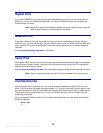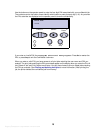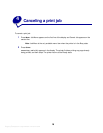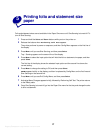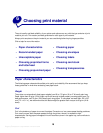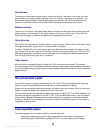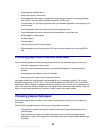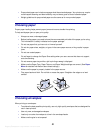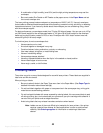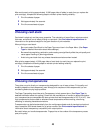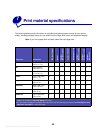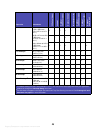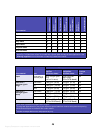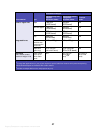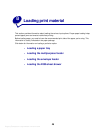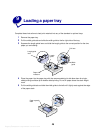
Argecy Computer Corporation 248-324-1800
22
• A combination of high humidity (over 60%) and the high printing temperatures may seal the
envelopes.
• Be sure to select Env Feeder or MP Feeder as the paper source in the Paper Menu and set
the correct envelope size.
The laser printing process heats envelopes to a temperature of 205°C (401°F). Use only envelopes
that are able to withstand these temperatures without sealing, excessive curling, wrinkling, or releasing
hazardous emissions. If you have any doubts about the envelopes you are considering using, check
with the envelope supplier.
For best performance, use envelopes made from 75 g/m
2
(20 lb bond) paper. You can use up to 105 g/
m
2
(28 lb bond) weight for the multipurpose feeder or 105 g/m
2
(28 lb bond) weight for the envelope
feeder as long as the cotton content is 25% or less. Envelopes with 100% cotton content must not
exceed 90 g/m
2
(24 lb bond) weight.
To minimize jams, do not use envelopes that:
• Have excessive curl or twist
• Are stuck together or damaged in any way
• Contain windows, holes, perforations, cutouts, or embossing
• Use metal clasps, string ties, or metal folding bars
• Have an interlocking design
• Have postage stamps attached
• Have any exposed adhesive when the flap is in the sealed or closed position
• Have nicked edges or bent corners
• Have rough, cockle, or laid finishes
Choosing labels
The printer can print on many labels designed for use with laser printers. These labels are supplied in
letter size and A4 size sheets.
When printing on labels:
• Be sure to select Labels in the Paper Type menu item in the Paper Menu. (See Paper Type for
detailed information about these settings.)
• Do not load labels together with paper or transparencies in the same paper tray; mixing print
materials can cause feeding problems.
• Do not load partial sheets with areas exposed by missing labels; this can cause labels to peel
off during printing, jam, and contaminate your printer and your print cartridge with adhesive. It
can also void your printer and cartridge warranties.
• Avoid using labels that may release hazardous emissions when heated.
Note: Labels are one of the most difficult print materials for laser printers. Your printer
requires a special fuser cleaner for label applications in order to optimize feed
reliability. See
Ordering supplies for information on obtaining a label fuser
cleaner.



